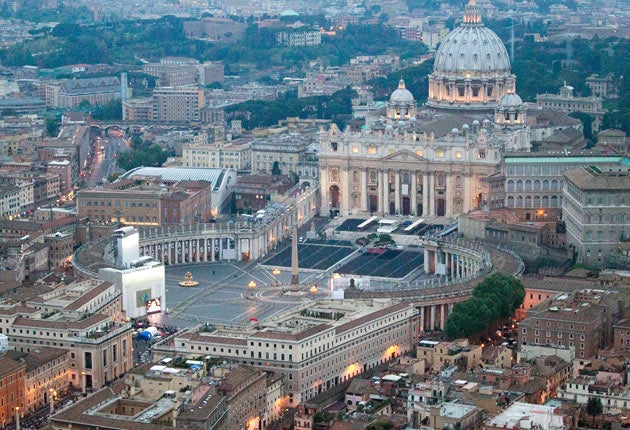Romans take a holiday after charlatan predicts earthquake

Your support helps us to tell the story
From reproductive rights to climate change to Big Tech, The Independent is on the ground when the story is developing. Whether it's investigating the financials of Elon Musk's pro-Trump PAC or producing our latest documentary, 'The A Word', which shines a light on the American women fighting for reproductive rights, we know how important it is to parse out the facts from the messaging.
At such a critical moment in US history, we need reporters on the ground. Your donation allows us to keep sending journalists to speak to both sides of the story.
The Independent is trusted by Americans across the entire political spectrum. And unlike many other quality news outlets, we choose not to lock Americans out of our reporting and analysis with paywalls. We believe quality journalism should be available to everyone, paid for by those who can afford it.
Your support makes all the difference.If Rome's usually bustling streets seem less busy than usual today it will be because hundreds of thousands of locals have decided to vacate the Eternal City for 24 hours – on the off-chance there might be a devastating earthquake.
Predictions of a disaster in the capital on 11 May 2011, attributed to a long dead pseudo-scientist, Raffaele Bendandi, have been dismissed and even ridiculed by public safety officials for weeks. But this hasn't stopped many Romans planning a day off so they can head for the country just to be on the safe side.
According to La Repubblica, 20 per cent fewer people than usual are expected to be present in Rome's schools and offices today. This was confirmed by figures quoted elsewhere in the media suggesting the number of days off requested by workers is up by fifth compared with 11 May last year.
Rumours about Benandi's dire predictions have been proliferating on social networking sites for week or even months.
At the start of April the civil protection agency began putting put out notices telling people not to panic after concern about the charlatan's predictions started to swell. The national television network RAI has run programmes aimed at preventing fear of a tremor. The city's La Sapienza University even organised an earthquake information open day, in combination with the National Institute of Vulcanology, to dispel the fears.
But Romans' concerns appeared to be down to Chinese whispers, much less cod-science. Paola Lagorio, the president of an association dedicated to Bendandi, which preserves all his manuscripts, claimed there was no clear reference to any major earthquake in Rome in 2011, despite claims to the contrary circulating in internet chat rooms.
Bendandi, who died in 1979 aged 86, did make many prophesies, however, and believed earthquakes could be predicted accurately on the basis of the interaction between the planets, the moon and the sun.
In 1923 he forecast a quake would hit the central Adriatic region of the Marches on 2 January the following year. He was out by two days, and, given the numbers of portentous warnings he produced, it might be argued that sooner or later he was bound to strike lucky.
Nonetheless, Italy's main newspaper Corriere della Sera called him: "the man who forecasts earthquakes". As a result Bendandi's fame grew and in 1927 he was awarded the Italian version of a knighthood by the Fascist dictator Benito Mussolini. Later in life, as he started to unnerve too many people, Mussolini forbade him publishing further forecasts on earthquakes, on threat of exile.
In Rome today, memories are still vivid of the 2009 L'Aquila earthquake, on the other side of Apennines, which killed more than 300 people and could also be felt in the capital.
Some high-profile Roman citizens have publicly stated that they will ignore the 11 May earthquake prediction.
The actor and TV presenter Claudio Amendola, said: "An earthquake in Rome. I don't believe it.
"I'm staying in my city. The city's eternal, it can't be destroyed."
Sticking to the scientific facts, rather than tempting fate, Franco Gabrielli, head of the civil protection agency, said: "Instead of concentrating on these urban legends, we should be checking to see if our houses are constructed to resist earthquakes."
Join our commenting forum
Join thought-provoking conversations, follow other Independent readers and see their replies
Comments